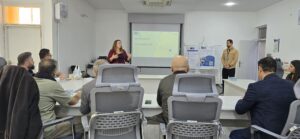Humanitarian Coordination in Iraq and Iraqi Kurdistan has been in transition since the end of 2021, as traditional Clusters were deactivated at the end of 2022 and the NGO Forum (NCCI) folded in 2023. This rapid transition often left gaps in joint needs analysis and a fragmented understanding of the humanitarian situation. However, despite the withdrawal of the IASC-led system, residual needs continue to exist, and those NGOs who continue to try and address these needs are often impeded by a range of bureaucratic challenges.
One such NGO is Rehabilitation, Education, and Community Health (REACH). For nearly 30 years, REACH has provided humanitarian support in some of Iraq’s most challenging environments. Since its founding in 1995 in Kurdistan, the organisation has expanded its operations to governorates including Ninewah, Sulaymaniyah, and Erbil.
Reliable Information for Daily Decisions
Since 2019, REACH has relied on INSO for security information and coordination. In particular they’ve relied on the real time incident reports to guide both movement and activity planning, especially in unfamiliar areas.
“Following major incidents, we issue reports containing verified information and analysis. Since rumours spread fast in these situations, our partners trust our updates for accurate and consolidated insights.” Says Oyessorzo Chowdhury, Head of Mission for INSO Iraq.
This is something echoed by REACH’s Deputy Director, Hero Anwar, “I have so much trust in INSO I don’t feel like I need to read the news every day. INSO updates us so quickly and efficiently [..] and I can always call and ask, ‘I want to go to this area tomorrow, is it safe?’ INSO is always available, inside and outside working hours.”
Crisis Coordination During Regional Escalations
In early June 2025, Israel launched an attack on Iran, stating its objective was to dismantle Iran’s nuclear programme. Iran responded with retaliatory strikes, and the two countries continued to exchange attacks over the following days.
During this time Iraq closed its airspace as a precautionary measure, which lasted throughout the 12-day escalation. This left many NGOs relying on land border crossings for both work and personal travel. Whilst Iraq was not directly a target during the escalation, debris from missiles and drones crossing Iraqi airspace fell across various parts of Iraq. Although this was mostly in uninhabited areas, some material damage was reported in more residential or populated areas.
During this period “INSO provided regular, reliable updates and even contacted NGOs directly,” REACH recalled. “Since NCCI closed, there aren’t many coordination bodies left. INSO filled that gap by organising informal meetings so we could hear what other NGOs were doing, and later by hosting a larger coordination meeting. That was so helpful, because we don’t always need names; we just need to know how many NGOs are doing what.”
INSO supported NGOs on visa options, contingency planning, and safe travel routes. During the escalation, REACH changed its travel plans between Erbil and Sulaymaniyah. Instead, they used a safer route within KRI, based on INSO’s guidance.
“I trust INSO analysis because of their experience,” says Hero, “Regular check-ins were very encouraging. They asked how our activities were being impacted and showed that we were not left on our own.”
Security Briefings and Analysis
With the closure of NCCI, INSO’s security briefings and roundtables have become one of the few remaining spaces for NGOs to meet and share information.
REACH often makes use of INSO roundtables, sharing “they are not only informative, but they give us a space to coordinate. Without INSO, we would only be sharing information individually. When INSO hosts, we get a much clearer picture [of the safety and access landscape].”

INSO Roundtable
INSO’s analysis also feeds into REACH’s internal reporting. “We used to have a dedicated security focal point” explains Hero, “but with restructuring and funding cuts that is no longer possible. Now, our staff in Mosul and Erbil use INSO alerts and analysis to update their own security reports and share with colleagues.”
Bureaucratic and Administrative Challenges
“Security challenges have evolved over time,” explains Hero, “After coalition forces retook areas from ISIL, we faced enormous pressure when it came to managing access and obtaining the necessary letters. There is a lot of bureaucracy which makes our work challenging.”
REACH is not alone in this, for NGOs in Iraq, the most persistent access barrier remains restrictions on domestic movements. These challenges are compounded by complex administrative demands, including difficulties obtaining official access letters, varying requirements between governorates, and arbitrary checkpoint delays. In some governorates movement is relatively straightforward without the need for access letters however, in areas like Sinjar, access barriers remain, slowing operations and increasing costs.
Programmatic interference is a related worry. In some instances, NGOs report pressure to change beneficiary lists or the types of assistance offered. In the face of such bureaucratic challenges, coordination space for NGOs to share and discuss is essential for preserving
humanitarian principles while keeping projects operational.
“What I like most about INSO is that they are in continuous engagement with partners, and adapt to what we need,” said Hero. “With INSO there is no gap. They are very close to partners and in continuous dialogue. That makes it easy.”
INSO Iraq is gratefully supported by Global Affairs Canada. If you are an NGO operating in Iraq and would like to register for INSO’s free safety and access services, you can reach out to register@iraq.ngosafety.org or register via our website.

